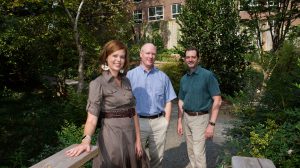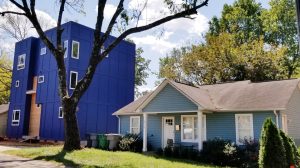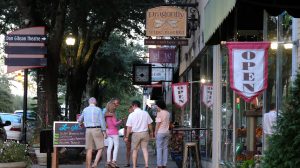Articles

Hard-earned paychecks in the Uwharries are all too often spent at chain stores with headquarters in far-flung locations, or at restaurants and shops in large cities, sending cash from rural to urban areas instead of keeping it in the local economy. The Eldorado Outpost has helped reverse that flow. The Outpost was the brainchild of […]

“A bus ticket and a bologna sandwich.” That’s a colloquial interpretation of the solution many economists suggest for addressing economic challenges in rural areas – move to a city where there’s more opportunity. While this school of thought acknowledges barriers that can make it difficult to relocate – education levels, job skills, housing costs – […]

This story is one of seven vignettes in the series Rural by Choice: Navigating Identity in the Uwharries. Education is often seen as the ticket out of a rural area. But the Robledo family has sought higher education – often in urban areas – to provide them with job opportunities so they can make their […]

This story is one of seven vignettes in the series Rural by Choice: Navigating Identity in the Uwharries. Ron and Nancy Bryant met at St. Mark’s Lutheran Church in Charlotte in the 1980s. “I was sitting in the second pew and noticed this man in the row behind me,” Nancy said. A Winston-Salem native, Ron […]

This story is one of seven vignettes in the series Rural by Choice: Navigating Identity in the Uwharries. Danny Alderman puts 1,200 to 1,400 miles on his truck each week. As the general superintendent of North Carolina projects for Branch Builds, he oversees about $250 million worth of work across the state, including schools in […]

An outdoor, living exhibit on its way to the UNC Charlotte campus will tell the story of North Carolina through plants and crops crucial to the state’s development. A team representing the University’s Center for the Study of the New South, Botanical Gardens and Urban Institute received a grant from the North Carolina Humanities Council […]

In 2018, Mecklenburg County issued over 5,000 permits for single family housing. That’s more than double the next fastest growing county: York, in South Carolina. But while Mecklenburg is still a major contributor to new housing in the region, it’s making up a smaller proportion of permits issued and now only accounts for about one […]
Nestled off a quiet street of attractive suburban homes in Waxhaw, there’s a quarter-mile trail in the woods along the Twelve Mile Creek. Near the end of a stone stairway is a striking sight: A 160-foot suspension bridge connecting Waxhaw, North Carolina, and Indian Trail, South Carolina. You can embrace the bridge’s wobbles during the […]

This is the third part in a three-part series. Read Part 1: Turning to musical heritage to fuel the future and Part 2: Looking for one ‘unique asset’ to catch up on the story. The revivalists in Shelby focused on “Uncle Earl” Scruggs and Don Gibson, approaching the county, the courthouse’s owner, about a first-rate […]

This is the second part in a three-part series. Read Part 1: Turning to musical heritage to fuel the future to catch up on the story. You can find Part 3: ‘A 38-year overnight success story’ online as well. What happened in Shelby played out across the Carolinas, where textiles were once the driver of […]
This is the first part in a three-part series. Read Part 2: ‘We needed to do something bold’ and Part 3: ‘A 38-year overnight success story’ for the next parts of the story. Thirteen years later, Brownie Plaster is still bemused by the chorus of laughs that rose one May afternoon in 2006. At the […]

The South Fork of the Catawba is not the river Ted Reece remembers from his youth. Reece, 91, can still picture the South Fork backed up to form a massive pool serving the Mays and Mayflower mills’ dyeing and finishing operations. It was wide and flat enough to land a seaplane — a spectacle he […]